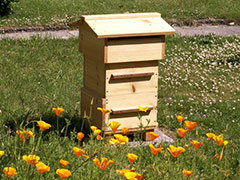We’ll Bee Damned if We Do, and Damned if We Don’t
Feb 03

However, Thompson cites a new study from the University of Maryland into the effects of antibiotics. The report, Killing Them with Kindness? In-Hive Medications May Inhibit Xenobiotic Efflux Transporters and Endanger Honey Bees explore the use of antibiotics widely used in the bee industry, such as oxytetracycline, and suggest that they’re preventing bees from effectively excreting widely used pesticides thus the “Catch 22” in Thompson’s title.
So, if we stopped feeding the honeybees pesticides, we expose them to pests like tracheal mites and the Varroa destructor mite. If we stop feeding them antibiotics, we expose them to a whole other range of pathogens and bacteria like American foulbrood (ironically present in Australia at the moment). So, we must continue using both, and we know that the antibiotic-induced inability to void common pesticides led to death rates of up to 51 percent in the study.
Source: http://www.theecologist.org/News/news_analysis/2262679/death_by_pest_or_pesticide_antibiotic_dangers_trap_bees_in_a_catch_22.html
Related Posts
- New York City’s Mayor Michael Bloomberg Gives his ‘Fracking’ Opinion
- Do We Have to Bring Down the Fossil Fuel Power Plant?
- The challenge of saving our planet: failure is not an option
- Losing the tropical forest biome: self-inflicted doom for man; updated article
- Deforestation May Be the Cause for Drop in Monarch Butterflies to Mexico




